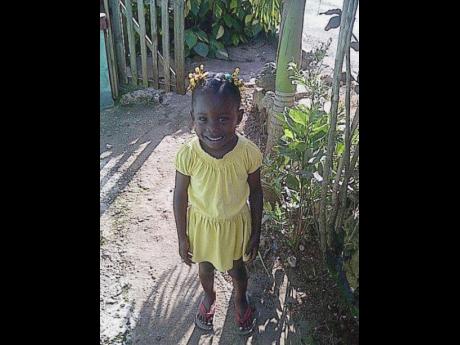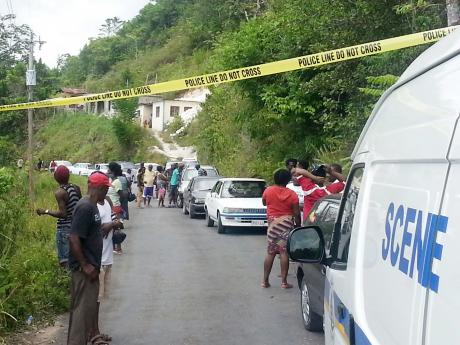Orville Taylor | It’s our child who was killed
She was found in the green bushes in Orange Hill. The coincidence of colours tells you that crime crosses colour lines and all age groups. It is not a body, the carcass of an animal, or remnants of a praedial thief's predation. Nevalesia Campbell was not a curiosity for onlookers; she was a warm, smiling gift from God, half of a twin. Somebody yanked her away, did unspeakable things to her, and then murdered her with less dignity than a hooved ruminant being prepared for a date with mannish water and curry. Keep that in your minds.
Of course, like any decent human being, we are revolted by what happened to this beautiful creature, and yet, paradoxically, we can sit and ogle the gruesome pictures on the Internet, pretending we care. The fact is, our unanimous emotion should be revulsion over the image of what remains of the infant, who carried with her the hope of an entire family, community, parish and nation. When a child dies, a large part of the future dies with her/him. Nothing is spectacular about the corpse of Nevalesia, and only the sickest of persons would want to post her picture, whatever the pretext of the poster.
The problem is, too many of us behave as if it is someone else's problem. Has anyone even imagined what horror it must be for the relatives of this baby to see the ignominious parading of the last photos of her shown in the worst possible way, for millions of people to see? And even if we are blaming her mother for her death, why would we want to denigrate the innocent further in death? True, the law says that one cannot sully the reputation of a dead person. However, the spirit of the Child Pornography (Prevention) Act of 2009 implies that persons shouldn't publish images of children, especially if they might have been sexually abused.
It might be weak law, but the strong sociology and moral underpinning of Section 2 (a) (iii) addresses images which depict "a child being subjected to torture, cruelty or physical abuse in a sexual context". Doubtless, the evidence is that the poor infant was subjected to at least a few of the adjectives and nouns above. Yet, I have to ask myself and the people who live in the vicinity of where she was being hurt and eventually killed: Did no one even hear any screaming or crying? Was the assailant so meticulous and careful that not even the dogs in the community were barking?
This then brings us to another piece of legislation, the Child Care and Protection Act (CCPA) of 2004. In a country where people thrive on 'faasness' and watch what each other wear and have in their houses as appliances and furniture, they cannot simply close their eyes and say, "Mi nu bizniz," when their neighbour's children are being neglected, abused or simply placed at risk. Under this legislation, anyone who has reason to believe that any child "has been, is being or is likely to be, abandoned, neglected or physically or sexually ill-treated; or (b) is otherwise in need of care and protection," must report this abuse to the authorities.
Under the law
Notably, not even learned counsel has protection under the cloak of client attorney privilege. Thus, a lawyer whose client confessed paedophilia or any other indecent or abusive contact with a child is him/herself liable for prosecution under the law if he/she fails to report it.
In this painful murder case, we now know that the mother and stepfather of the infant have been charged under the CCPA, and rightfully so. Furthermore, my suspicion is that having given false statements about the child getting up to ask for water and disappearing like a ghost in the middle of the night, there might be other charges. Indeed, almost all statements given to the police have the sentence, "I shall be liable to prosecution if I have wilfully stated in it anything which I know to be false or do not believe to be true." So, let's see how that develops.
They were charged because the evidence was that they were not in their beds doing their 'dance', as was reported, but were some distance away, listening to some 'drum pan' sound system while women, in the name of entertainment, squeezed themselves in their little sister's dresses and men exposed their semi-dirty boxers, dressed in their sisters' 'spangies', which can't be pulled up past their butt cheeks. Yep, entertainment was worth leaving children alone.
Nonetheless, I am incredulous that only the perpetrator knew that the children were alone. Was it a case that the neglect was habitual and that he was simply waiting for the opportunity to pounce? And if it was habitual, why didn't the neighbours, even one 'dege-dege' person, report them or simply upbraid them and tell them to not leave their children at home alone. In the rural and inner-city communities that I knew about when I was a boy myself, people would either give an eye on children left alone or reprimand the 'cayliss' parents. Where were the elders?
Notice that I have not addressed the criminal or the police. The latter acted swiftly and caught the suspect faster than some politicians produce lies. Thus, there is no question of impunity and its impact on deterrence. Nor is the murderer under the spotlight. Analysis of the motive for the dastardly deed is for another time. What concerns me is the reduction of opportunities for criminals to carry out their acts.
We do not leave our little shihtzus in the yard with rottweilers, and even a big pussycat can treat him like a hot dog. Research shows that very young children are more likely to be harmed by close family members and persons known to their relatives.
If the curiosity were focused in the right place, it is pussycat who would have been killed, not the infant.
- Dr Orville Taylor is senior lecturer in sociology at the UWI, a radio talk-show host, and author of 'Broken Promises, Hearts and Pockets'. Email feedback to columns@gleanerjm.com and tayloronblackline


